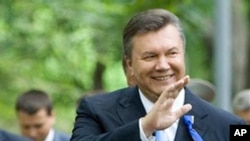Russia and Ukraine are in tough talks to avoid what could be their third gas war in five years. Our correspondent reports on what is behind the tension.
On Friday, Russian President Dmitry Medvedev warned Ukraine, “You can’t torpedo existing contracts.” Earlier, Ukrainian President Viktor Yanukovych threatened to take Russia to international arbitration to decide their fight over Ukraine’s top import - Russian gas. The move calls into question the Russia-Ukraine rapprochement that was supposed to follow last year’s election of Mr. Yanukovych, the so-called "pro-Russian candidate."
Oleg Voloshyn, a spokesman for Ukraine’s government, says in an interview in Kyiv that behind the rancor is Ukraine’s refusal to join a Moscow-led customs union.
“We want to be friends with Russia, but we want to move to European Union," said Voloshyn.
In the last year, Russia’s top leaders have all spelled out to President Yanukovych the benefits of joining a customs union with Russia, Belarus and Kazakhstan. Gazprom has dangled an $8-billion discount on Ukraine’s gas bill. But in a series of personal rebuffs, Ukraine’s president repeatedly refused.
Viktor Chumak, director of the Ukrainian Public Policy Institute, says public opinion polls consistently show that more than 70 percent of Ukrainians want their country to join the European Union.
Chumak says Ukraine’s government and opposition are only divided regarding tactics on how to reach the same goal - joining the EU.
In public statements before and after Ukraine’s August 24 Independence Day celebrations, President Yanukovych flatly stated that he has set a 10-year goal for Ukraine to join the European Union. He hopes that a framework agreement will be signed by December between Ukraine and the European Union.
Oleg Voloshyn at the Foreign Ministry again:
“Our position here is that we really do aspire to become part, and a member of, the European Union," he said.
Parallel to these talks with Europe, talks with Moscow on Ukraine’s 10-year gas contract are getting increasingly sharp. On Tuesday, Prime Minister Vladimir Putin symbolically opened North Stream - a direct Russia-Germany gas line that runs under the Baltic Sea. The line is essentially a 1,200-kilometer end run around transit countries, such as Ukraine.
After turning a pipeline wheel, Putin declared, “We are slowly and surely turning away from the dictates of transit states.” Believing that Russia has a strong hand, Mr. Putin has said that Ukraine would also get a gas price discount if it allowed Gazprom, Russia’s state gas company, to buy Naftogaz, Ukraine’s state gas company.
Alyona Getmanchuk, director of Kyiv’s World Policy Institute, compares that merger to “a supermarket taking over a kiosque.”
She says Gazprom contracts tie Russian gas prices to world oil prices. They are on a ‘take or pay’ basis. She says companies have to pay for gas they do not use. World gas prices are low as shale gas production has soared in the United States, taking the U.S. out of the market as an importer.
Companies in Greece, Germany and Italy are seeking to cut the link between gas and oil prices - and to bring Russian gas prices down to world levels. With billions of dollars at stake, Kyiv’s Getmanchuk believes that another gas war is in the cards.
With billions of dollars at stake, Kyiv’s Getmanchuk believes that another gas war is in the cards.
In the last gas war, in January 2009, Russia cut gas supplies to Ukraine, affecting at least 10 European countries for three weeks in the middle of winter.
Kyiv’s Move Toward EU Fuels Ukraine-Russia Gas Tensions
- By James Brooke
